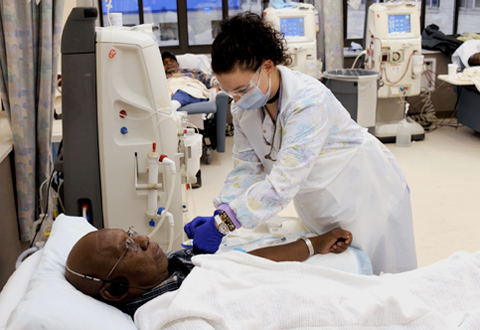Center for Health Equity Research and Promotion
CHERP: Equity in Kidney Transplant

Minority patients are less likely to complete transplant evaluation.
CHERP’s Larissa Myaskovsky, PhD, leads study: “Increasing Equity in Transplant Evaluation and Living Donor Kidney Transplantation”
Minority patients are more likely than whites to have end stage kidney disease, but less likely to complete transplant evaluation, receive a kidney transplant overall, or a living donor kidney transplant (LDKT), the best treatment for end-stage kidney disease. A new research study funded by the National Institute of Diabetes, Digestive and Kidney Diseases and led by CHERP’s Larissa Myaskovsky, PhD will test the efficacy and cost effectiveness of a comprehensive, system-level fast-track kidney transplant evaluation for minorities in reducing time to complete transplant evaluation and increase kidney transplantation. And, using a randomized-controlled trial, the team will test the effectiveness of an educational video and booklet to encourage discussion and pursuit of LDKT. Findings from this work may help reduce disparities in transplant evaluation and LDKT.
LDKT is the optimal treatment for end-stage kidney disease. But, the evaluation process for a kidney transplant is lengthy, time consuming, and burdensome to the patient. Also, race disparities exist in rates of transplant evaluation completion, transplantation, and LDKT. Dr. Myaskovsky’s previous and ongoing NIDDK-funded research indicates that cultural factors (i.e., perceived discrimination in health care, religious objection to LDKT), transplant knowledge, and demographic characteristics (e.g., age, education, and income) independently and significantly predict time to complete transplant evaluation. In December 2012, the University of Pittsburgh’s transplant center implemented a one-day streamlined evaluation process, dubbed Kidney Transplant Fast Track (KTFT), but it has not been evaluated for efficacy or cost effectiveness. This new study will determine the efficacy and cost-effectiveness of the fast track program compared to a matched historical control group who participated in Dr. Myaskovsky's previous work.
At the same time, the team will conduct a randomized controlled trial targeting vulnerable patients with the educational component of the TALK intervention (Talking About Live Kidney Donation) to increase LDKT. For both components of the proposal, vulnerable populations will be targeted because they are most at risk for extended evaluation times and lower rates of LDKT. Participants will be randomly assigned to TALK versus no-TALK conditions and undergo two interviews at pre-transplant work-up and at completion of transplant evaluation in order to: (1) test whether KTFT and TALK will reduce transplant evaluation time, and increase rates of transplant and LDKT in members of vulnerable groups; (2) determine whether engaging in a streamlined and coordinated-care evaluation experience within the transplant center reduces negative perceptions of the healthcare system; and (3) test the cost effectiveness of the KTFT with TALK relative to standard practices. The results of this two-pronged approach will help pave the way for other transplant centers to implement a fast-track system at their sites, improve quality of care by transplanting a larger number of vulnerable patients, and may help address stark race/ethnic disparities in rates of LDKT.



















